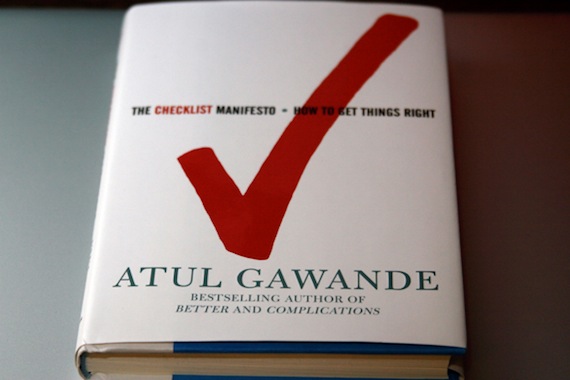Have you ever read a great book that references another book and always want to read the book referenced but always forget what that book was called and never get around to reading it? Yeah me too. I was reading a book by Gladwell and he referenced “The Checklist Manifesto” and how checklists had been used by surgeons to lower the death rate in hospitals by over 60%. I was intrigued and made a mental note to follow up and read that book and for the first time I think ever I followed up on a book within a book.
Every person who leads should read this book especially if you are leading in either a complex or a stressful environment. I believe this book has huge implications for kids ministry and leadership in general. If you could reproduce yourself quicker with more mesurable results wouldn’t you? The check list has a place in church ministry. If we are in a place where we have to innovate to keep balls from being dropped. Checklists are an option, why? Because they externalize structure.
Here is where I think we can use checklists in ministry.
1. Emergency Plans – need a checklist
2. Sound guys – need a checklist
3. On stage communicators – need a checklist
4. Check-in welcome teams – need a checklist
If you are doing a task that requires repetitiveness in any form you need a checklist or you are going to forget the importnat stuff. For example Check-in people turn the computer on, check the name tag printer, check the intake forms, SMILE. If we don’t see the check box for smile we could forget that our job is about people not computers. My mind is still spinning with the possibilities of how I can begin to use checklists in a way that helps us as a church automate tasks so we can focus on people and not worry about the small stuff. Let the checklist take care of that.
Here are a couple quotes from the book:
“We need a different strategy for overcoming failure, one that builds on experience and takes advantage of the knowledge people have but somehow also makes up for our inevitable human inadequacies. And there is such a strategy- though it will seem almost ridiculous in its simplicity, maybe even crazy to those of us who have spent years carefully developing ever more advanced skills and technologies. It is a checklist.”
“The biggest cause of serious error in this business is a failure of communication”
“The philosophy is that you push the power of decision making out to the periphery and away from the center. You give people the room to adapt, based on their experience and expertise. All you ask is that they talk to one another and take responsibility.”
Lee Scott Walmart CEO to his company regarding Hurricane Katrina “This company will respond to the level of this disaster, a lot of you are going to have to make decisions about your level. Make the best decision that you can with the information that’s available to you at the time, and, above all, do the right thing.”
“If the American government had responded like Wal-Mart has responded, we wouldn’t be in this crisis.” Jefferson Parish’s top official, Aaron Broussard
“I came away from Katrina with a kind of theory: under conditions of complexity, not only are checklists a help, they are required for success. There must always be room for judgment, but judgement aided – and enhanced – by procedure.”
“There are good checklists and bad. Bad checklists are vague and imprecise. They are too long; they are hard to use; they are impractical. They are made by desk jockeys with no awareness of the situations in which they are to be deployed. They treat the people using the tools as dumb and try to spell out every single step. They turn people’s brains off rather than turn them on.”
“Good checklists, on the other hand, are precise. They are efficient, to the point, and easy to use even in the most difficult situations. They do not try to spell out everything – a checklist cannot fly a plane. Instead, they provide reminders of only the most critical and important steps- the ones that even the highly skilled professionals using them could miss. Good checklists are, above all, practical.”
“When we look closely, we recognize the same balls being dropped over and over, even by those of great ability and determination. We know the patterns. We see the costs. It’s time to try something else. Try a checklist.”
Check out the book Checklist Manifesto by Atul Gawande you will be glad you did. My head is still spinning with the possibilities of this book.


Pingback: Checklists aren't for idiots | Childrens Ministry Online
Testing 123
Can’t wait to read this book was just thinking about checklists before I popped on your blog. Guess God is into to this and I need to read it. Thanks!
Pingback: Book Review: The Checklist Manifesto by Atul Gawande | Childrens Ministry Online
Pingback: Book Review: The Checklist Manifesto by Atul Gawande | Childrens Ministry Online